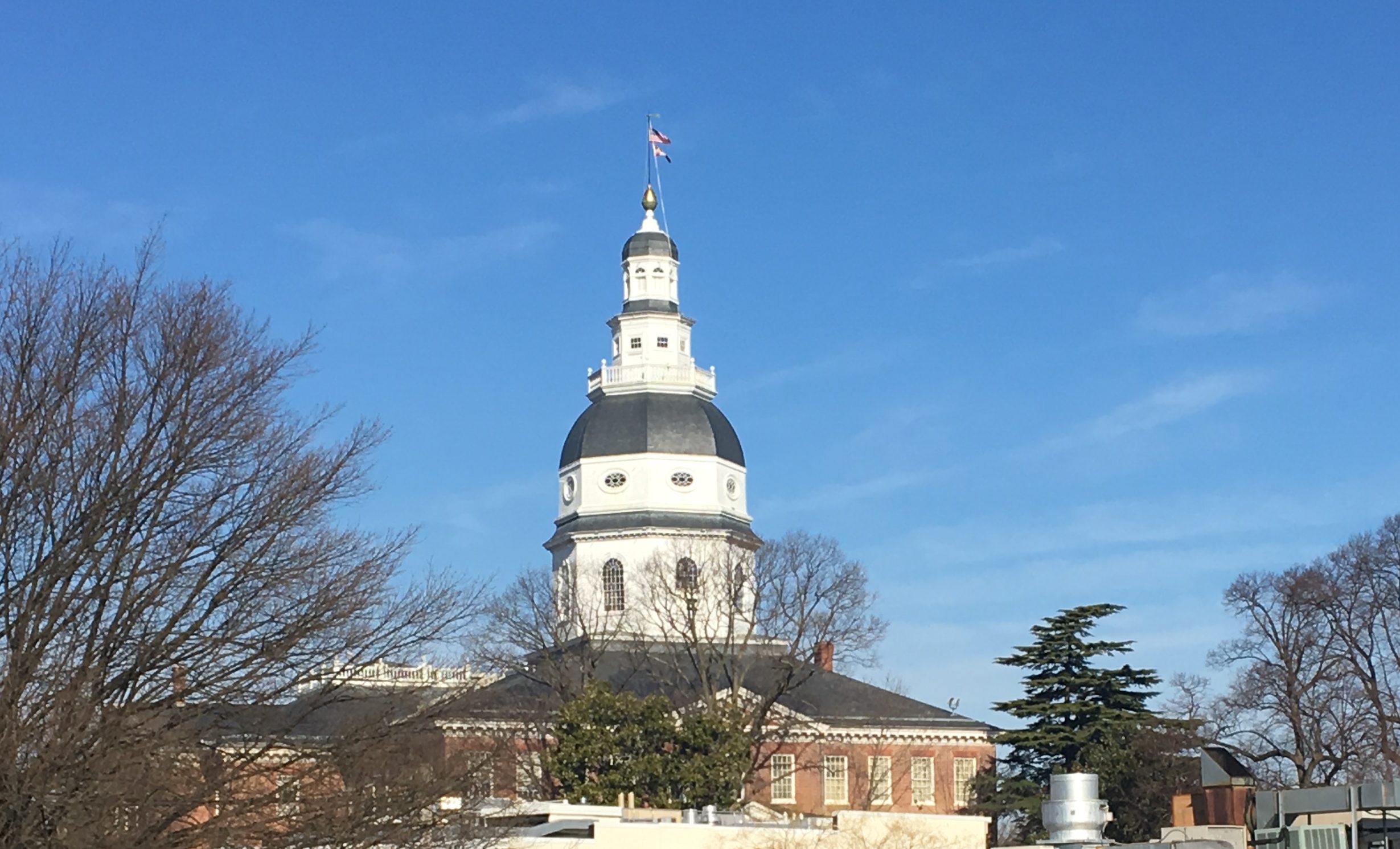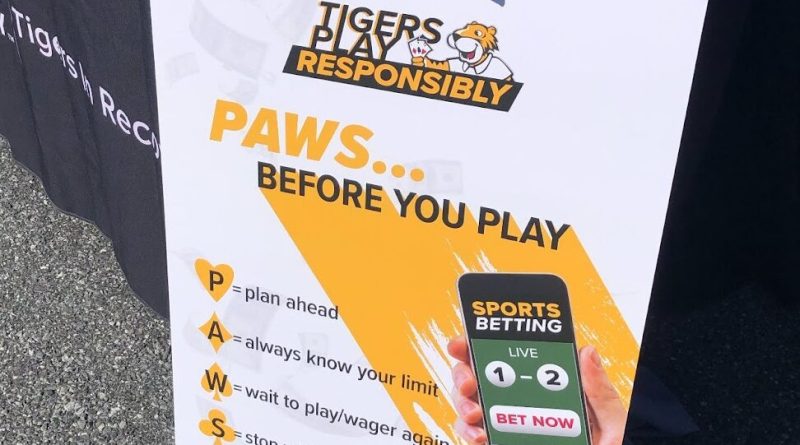Towson University is trying to get ahead of the lure of sports betting
The in-app banner ad, sent at random, advises them to “PAWS”: “Plan ahead, Always know your limits, Wait to play again/wager again, Stop while you’re ahead.”
With this marketing campaign, Towson is stepping in front of a trend: explosive growth of sports betting across the U.S., including on college campuses.
In studies conducted from 2007 to 2014, researchers found that 75% to 80% of college students had gambled in the previous year. Opportunities to bet have expanded since the U.S. Supreme Court opened the door to sports betting in 2018.
A grant from the National Council on Problem Gambling has helped the Baltimore-area college create what it hopes will become a national model for what a university can do to help its students.
“The hope and the goal [is] that we can really develop some incredible work that sets the standard for other universities to tackle this topic,” said Jaclyn Webber of the university’s Alcohol, Tobacco, and Other Drug Prevention Center. “There isn’t a lot of evidence-based information out there about gambling prevention.”
Keith Whyte, executive director of the problem gambling council, said his organization selected Towson for the grant because “we believe that preventing high-risk populations was the area that had the least amount of funding and could make the biggest impact.”
Joshua B. Grubbs, a professor of psychology at Bowling Green State University who studies addiction, said college students “are at that age group where we start to really begin to see addictive tendencies emerge.”
“You’re more likely to drive fast and get speeding tickets, you’re more likely to try illicit substances, you’re more likely to binge drink, right? You’re also more likely to try gambling,” Grubbs said, referring to the vulnerabilities of young adult men. “Because of that, you’re more likely to encounter something that you may later develop an addiction to.”
Towson University is implementing a program, “Tigers Play Responsibly,” that seeks to educate students through robust anti-problem gambling workshops and marketing campaigns.
Funded by the National Council on Problem Gambling’s $40,000 Agility Grant, educators work tables at sporting events, conduct giveaways, maintain a messaging campaign on social media and geo-target mobile advertising to students at sporting events or near sports venues with messages designed to prevent problem gambling. In partnership with Towson’s athletics program, the “Tigers Play Responsibly” ad campaign also is featured in athletics publications and on bus panels near athletics sites.
“It’s good that the school provides it,” said Peter Ariano, a Towson senior and frequent sports gambler. “I think it’s something that’s a dire need for colleges.”
Susan Foss, a parent of a 23-year-old who gambles, said, “I think anytime you can reach even a small segment of the population, it’s valid.”
But not everyone has faith in the service’s ability to reach and assist dedicated gamblers.
“I don’t think any Towson student is going to listen to an outreach on responsible sports betting,” said Mike Koanang, a Towson senior and frequent sports bettor. “I think they’re just going to go with their flow — whatever has been making them win money.”
There are limits to what can be achieved by the nascent program at Towson. It has a relatively small pool of funds and a short time frame to work with. The grant expires in March and the university must provide metrics showing success to get additional funds.
Even if more money isn’t forthcoming, Webber said the program has developed a “lot of material and lots of information” that they can continue to use.
Emily Wiegand, assistant director and manager of substance education, treatment and prevention services in Towson’s Counseling Center, said few, if any, schools have a program of awareness and education as extensive as Towson’s.
“When we were writing the grant, we did a pretty thorough search to see if other schools were doing things to try and get some ideas for our own application,” Wiegand said. “We found a few schools that have a gambling screening available, but could not find any comprehensive gambling prevention programs along the lines of what we planned to develop here at Towson.”
James P. Whelan, the director of The Institute for Gambling Education and Research at the University of Memphis, said he admires the work Towson has done. But its $40,000 grant is “a drop in the bucket.”
Funding for problem gambling research and support is not consistent, Whelan said. None of the $7.6 billion in annual federal gambling tax revenue goes to help prevent or treat gambling addiction, according to the problem gambling council. Instead, research relies on how much money a state or institution is willing to allocate to the issues.
“If Congress says, ‘Hey, we need money to research gambling disorders,’ then the money will be there. But they haven’t done that,” Grubbs said.
Public opinion is not driving additional spending. According to the Pew Research Center, a majority of adults say sports betting legalization is neither a good nor bad thing for society.
Other universities have responded to sports betting changes by trying to influence legislation in hopes of distancing college sports betting from their campuses.
Presidents of major universities in Virginia and Massachusetts sent letters to their respective state legislatures, urging them to oppose legislation they contend would create problems for students.
In Virginia, the legalization of betting on in-state college sports teams passed in the Senate of Virginia, but died in the House of Delegates.
“I would guess that the drivers [of the policy failing in the House] were influenced by the presidents,” said Virginia state Sen. T. Montgomery “Monty” Mason. “Obviously presidents of colleges and universities should have a great deal of influence on any higher education policy.”
In Massachusetts, seven school presidents and six athletics directors from universities ranging from Harvard to Merrimack College wrote a letter urging legislators to remove college sports betting from the proposed policy.
“Based on our years of experience, each of us believes that such legislation will create unnecessary and unacceptable risks to student athletes, their campus peers, and the integrity and culture of colleges and universities in the Commonwealth,” university officials wrote.
This story was produced by The Shirley Povich Center for Sports Journalism and the Howard Center for Investigative Journalism at the University of Maryland’s Philip Merrill College of Journalism. The Povich Center was established with a gift from the Povich family. The Howard Center is supported by a grant from the Scripps Howard Foundation.

Capital News Service is a student-powered news organization run by the University of Maryland Philip Merrill College of Journalism. With bureaus in Annapolis and Washington run by professional journalists with decades of experience, they deliver news in multiple formats via partner news organizations and a destination Website.

